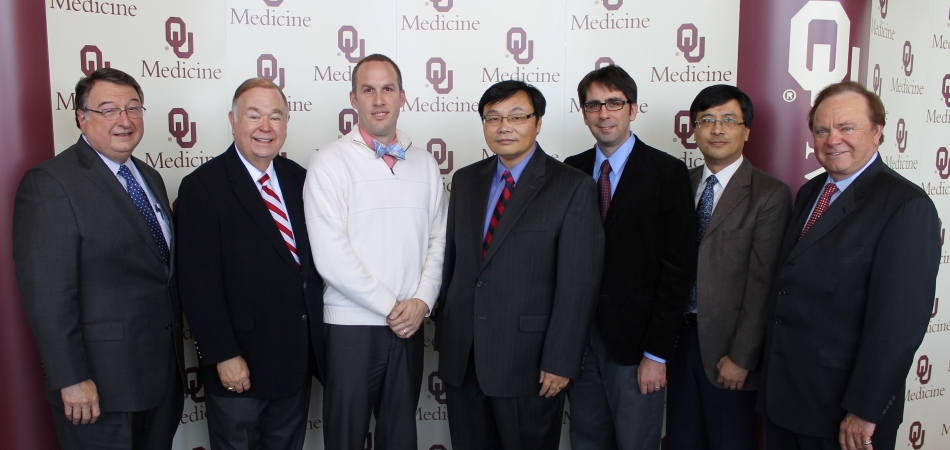CoBRE: Mentoring Diabetes Research in Oklahoma

M. Dewayne Andrews, MD, MACP, OU President - David Boren, Frank Hays, PhD, Yun Le, PhD, Kenneth Humphries, PhD, Jian Xu, PhD, and Mr. Harold Hamm
Diabetes is developing into a pandemic of the early 21st century. Its prevalence in Oklahoma is higher than in most other states in the US, with almost 10% of the population affected. Diabetes is particularly prevalent among Native American communities, where it affects up to 40% of older individuals in some tribes. Oklahoma has almost 400,000 Native Americans, second only to California in absolute numbers. Moreover, because many Oklahomans live in rural and relatively under-served areas, many diabetic patients are not diagnosed or treated until complications occur. Thus, diabetes represents a major threat to the health of the working population, and constitutes an immense social and economic burden in Oklahoma.
The diabetes research program at the Oklahoma University Health Sciences Center (OUHSC) has expanded rapidly since 2002. In 2005, diabetes research was identified as one of the top two priorities in the Provost’s Research Strategic Plan for the next five years. The State Legislature approved $10.5 million in 2006 as initial support to establish a diabetes center in Oklahoma. Mr. Harold Hamm has donated $30 million to start Harold Hamm Diabetes Center.
To enhance our diabetes research program in Oklahoma, we plan to train intensively our best junior investigators and to attract other new investigators into the area diabetes research. This CoBRE application is designed to help in accomplishing these goals, and is strongly supported by the OUHSC leadership, the president of the University, and the state government. The Specific Aims are:
- To mentor promising junior investigators (PJIs) in diabetes research, enabling them to become independent NIH funded investigators. Five PJIs have been selected. Each has been assigned at least one or two mentors who are established diabetes researchers in Oklahoma with expertise related to the PJI’s project. In addition, five distinguished scientists in diabetes research outside of Oklahoma will serve as External Advisors to direct, assist, and mentor the PJIs. The CoBRE will enhance the training of talented young investigators in diabetes research, and the recruitment of new junior investigators to expand our diabetes research program.
- To establish and consolidate research infrastructure to support diabetes research, optimize the research environment for the PJIs, and form a core resource for diabetes research Oklahoma. The CoBRE established four core facilities during its first term. These have been serving the diabetes research community in Oklahoma. We will maintain and continue to improve these core services.
- To recruit funded diabetes researchers to Oklahoma. With support from both the Harold Hamm Diabetes Center (HHDC) and OUHSC, the Phase two CoBRE will recruit funded diabetes researchers to OUHSC to increase the critical mass of the diabetes research program, HHDC and the CoBRE.
- To foster and enhance collaborations between basic scientists and clinicians, and to facilitate translational research directed toward the development of new treatments and preventive measures for diabetes and its complications. The mentoring team includes established scientists and clinicians with experience in diabetes research and diabetes care. The CoBRE will promote partnerships not only between basic and clinician researchers in the Adult and Pediatric Sections of Endocrinology and Diabetes, but also with basic science departments, in order to strengthen translational research.